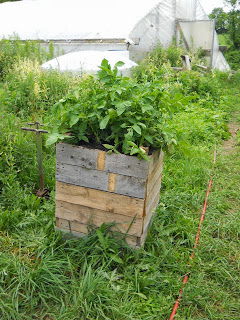Earlier
this year, I was turned onto the idea of a potato box. What exactly is a potato
box? Why a box in which to grow potatoes of course! But that does not truly
address the situation now does it? I shall explain…
I first
witnessed the way potatoes grow when I was very young, for my parents grew them
in their gardens. Being very young at the time, my memory only embraced the
digging up of those potatoes and nothing about how they actually grew. Since
then, more specifically, since I have been farming organically, I have raised
potato plants for not quite a decade at this point, and as I constantly
question about how plants grow… and thrive, I was intrigued this past spring by
the notion of a potato box.
How I
was led into this arena, I cannot remember for sure, perhaps a suggestion,
again, I do not remember. Nonetheless, I searched on line for an example… And here it is: http://www.apartmenttherapy.com/how-to-grow-100-pounds-of-pota-81760 “How to grow 100 pounds of potatoes in 4
square feet” is the headline. Is that possible? I would be happy to harvest
that from 50’ of row!
So,
this spring, I decided to experiment with this. Spare lumber was available, along
with the incredible curiosity within me that constantly questions on how to
fully allow a plant to “achieve its best”, if you will. The decision was made.
Let’s discover whether this potato box can actually produce 100 pounds of
potatoes, or, is it merely another “pie in the sky” claim.
What
really enticed me into investigating this situation was the knowledge I had
earned on how certain solanacae plants grow, and in particular, tomatoes. Both
potatoes and tomatoes are part of the solanacae family. I have long been aware
of the wisdom to “hill” potatoes, that is, mound up dirt over the growing
plants to allow for more growth. This is somewhat difficult to explain without
witnessing. Nonetheless, tomato plants will develop roots along any part of the
stem of the plant that touches the ground. Without having truly investigated
potatoes, was it possible that the same situation resulted?
In
order to discover more about the potato plant, a potato box was constructed.
Using pine boards, a base was created that was about six inches deep. Inside
the base about two inches of soil mix was added, on top of which seed potatoes
were planted, one in each corner and one in the middle for five in total. Then
three more inches of soil mix was added. It looked like this at that point…
Making sure it was
watered daily, after a few weeks, it looked like this…
Only two of the five seed potatoes actually sprouted and
grew. Nonetheless, the experiment was in full flow. Even with only two plants
to analyze, something should be learned from the experiment. After a couple
more weeks of growth, the second layer was added along with more soil mix…
The two plants certainly appeared healthy and were growing
vigorously. Then, the third level was added with more soil mix…
VERY healthy looking potato plants were flourishing at that
point! And the growth in the third level went nuts!!!
So a fourth level was added…
At that point I was wondering how many levels would be
needed for the rapidly growing potato plants. In my mind, I was envisioning
potatoes growing from the vines all the way up to the top of the fourth level,
as tomato plants would grow. But I forced myself to stop with four levels. If
it turned out to be an amazing success, next year, I would add even more levels.
And so, as potato plants do, they eventually began to “die
back”…
…until the plants were completely dead…
Once
the plants were completely dead, it was time to dig up the potato… box to
discover the harvest! Here we go!!!
The top level was removed, and as I sifted through the soil
mix… almost no potatoes…
The next level was removed, and… hey! A potato!... but that
was it!
Another potato appeared as the bottom layer was reached. At
this point in the harvest, it was quite clear to me that the multi-tiered
potato box was over-kill. The amount of potato plant growth was AMAZING, but
only two small potatoes resulted from the upper levels.
The bottom layer was emptied next to reveal… quite a few
potatoes! However, some of the potatoes were misshapen due to constriction in
the box, but the amount of potatoes was well worth it…
Not at all bad for two potato plants…
…which netted over 4.5 pounds per plant, which is as much as
three times what is produced in the field!
The other odd thing was that the potatoes had less color
than the ones grown out in the field.
So, the
potato box did not work as I had envisioned. And, the “grow 100 pounds in four
square feet” claim is a false one. Nonetheless, if one is a patio gardener,
this could be an easy means of growing your own potatoes, only I would cut back
the layers to maybe just one extra. I guess it would be possible to stagger the
plantings, that is, adding more potato seed to the second level…
All in
all, I have definitively learned how a potato plant grows through this
experiment. Potatoes are definitely a straight forward plant that has a
specific grow period. The farmer/gardener can assist the plant by mounding soil
and such, but there is no need to build a tower around it. And after all has
been said and done, as a person who has never met a potato I have not liked, I
now have 9.17 more pounds of Kennebec potatoes to devour!
















No comments:
Post a Comment